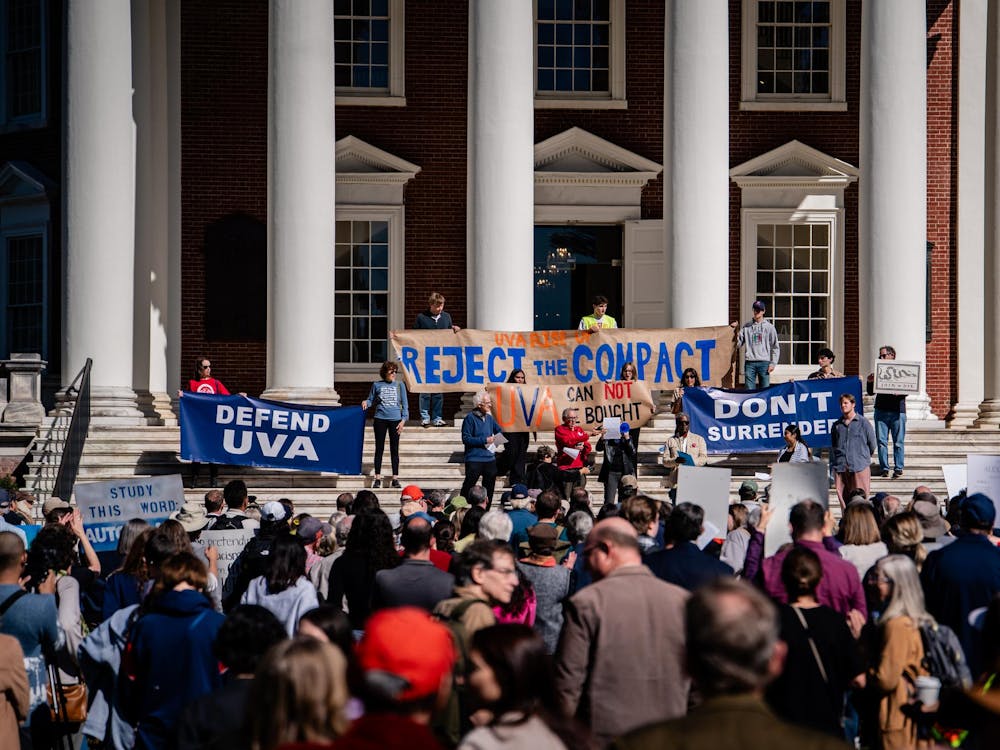LAST MONDAY, Students Defending Democracy and TheBurke Society hosted Robert Spencer, the author of "The Politically Incorrect Guide to Islam (And the Crusades)," at an event intended to spark discussion of the "jihadist threat." We -- a Muslim, a Christian, and a Jew -- attended the talk; we would like to offer some correctives to what we heard.
We agreed with many points -- with Spencer's reminder that jihad, "struggle," often appears in peaceful contexts and with his condemnation of the Bush administration's foreign policy toward Muslim countries. He also remarked the presence of a militant and supremacist interpretation of the Qur'an among certain Muslim thinkers since the early days; this is also correct, as long as we remember that over the 1,400 years of Muslim history there have been many other readings.
The way these facts were presented, however, is another matter. Spencer frequently failed to give a complete picture. For example, distinguishing between violent and non-violent meanings of jihad is merely a good start; one must also note differences even among groups who use the violent sense. They have a wide variety of ideas about the means, the opponent and the final aim of their "struggles."
Spencer's failure to make such distinctions could lead an audience to understand all jihadis as threats to the United States or to Western civilization; in fact, some direct their efforts against dictatorships or occupations but have no interest in other targets. Egypt's Muslim Brotherhood and Gama'a al-Islamiyya fought Mubarak's regime, but also severely criticized the Sept. 11 attacks. Thus, although all jihadis cite the same Islamic sources, Spencer's inference of a uniform jihadist impulse toward world domination is incorrect.
Similarly, Spencer asked why moderate Muslims do not do more to condemn violent jihadis or publicize an alternate understanding of Islam. A fair question; but thorough consideration reveals some answers that Spencer ignored.
Moderate Muslims are often constrained on two sides: Besides the jihadis, there are their repressive governments, which generally have little sympathy for an Islamist agenda. However, those governments frequently aid the jihadis when they find it useful to do so; the Pakistani government's support of the Taliban in the 1980s and 1990s is a case in point. As a result, moderates' criticism of jihadis often goes together with criticism of the regime, and the latter can be as dangerous as the former. Look again to Pakistan for the case of Asma Jahangir, a moderate female Muslim lawyer placed under house arrest by the Musharraf regime, and for many critical journalists who met worse fates.
Islamic extremism is a real phenomenon; but oversimplifications like Spencer's risk making their hearers less able to analyze and respond appropriately. To the contrary, these incomplete alarms risk producing a narrow conception of Islam as something alien and dangerous. Translated into policy, that attitude could actually increase extremists' power.
Take the recent case of Muslim scholar Tariq Ramadan, a moderate thinker who has offered sophisticated reasons, from a Muslim context, why the Qur'anic passages on violent jihad are not binding today. In 2004 he was to begin work at Notre Dame University, an excellent pulpit from which to proclaim a non-violent Islam.
Unfortunately the State Department denied him entry. The official reasons took two years to emerge: small donations to two charities that were subsequently -- a year after the donations -- classified as terrorist fundraisers. Ramadan is arguing in court that he could not have known of these alleged connections before the U.S. government did; but meanwhile the academy loses a moderate voice, at least in part because of a climate of excessive fear, and extremist voices gain strength proportionately.
Is there another approach? Yes. And it does not, despite his assertions to the contrary, involve suppressing Spencer's freedom of speech. Nor does it involve denying the presence of preachers who exploit Islam for violent ends; nor denying the presence of violent passages in the Qur'an. It involves acknowledging those things -- but then going further.
Like Spencer, we want to see awareness of Islam grow, but we think awareness must include the religion as a whole, as concretely lived today by nearly twenty percent of the world. We think that one of the best moves toward awareness is the sort of thing we authors are doing -- collaborating in work and friendship across religious lines. We have found that the concrete witness of a friend who simply lives out Islam in day-to-day life is an invaluable aid to understanding.
We should also recognize how many aspects of "our" Western culture owe their existence to intellectual interchange with Islam. Modern talk about "essentialism" and "existentialism," for example, traces its ancestry to Ibn Sina, a Muslim philosopher of a millennium ago.
Finally, we must attend to Islam's long and complex history, without which we will badly misunderstand what happens today. Let us, for example, take one or two of the University's many courses on Islam. Anyone who does that will meet the things that concern Spencer, but will also meet much else; and such a person will be much better equipped to begin assessing, without over- or under-estimation, the reality of the jihadist threat.
Omer Shaukat, John Bugbee and Daniel Weiss are Ph.D. students in Religious Studies.






